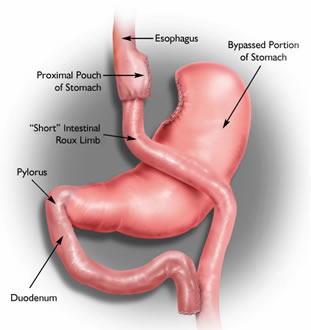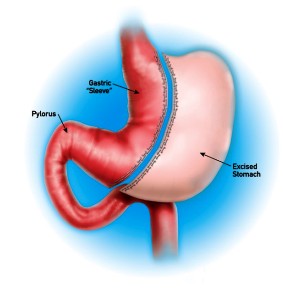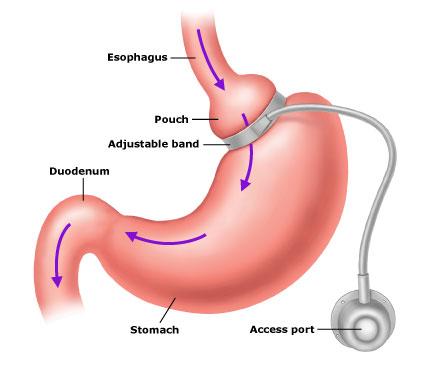Gastric Bypass
The gastric bypass is considered the “gold standard” of bariatric surgery. It results in the highest weight loss, usually 60-80% of your excess weight.
There are two parts to the procedure. First, the stomach is cut to form a new, small stomach pouch. Next, the small intestine is also divided and reconnected so that food from the new stomach pouch goes directly into a more “downstream” part of the small intestine. This limits what is absorbed from the food you eat. Because of these changes in absorption, it is very important to continue certain vitamins and medications every day after gastric bypass surgery.
Sleeve Gastrectomy
Sleeve gastrectomy is the most common bariatric surgery performed in the U.S. today. It also results in very good weight loss, usually 60-70% of your excess weight. The sleeve procedure is simpler than the gastric bypass and easier and shorter to perform. About 2/3 of the stomach is permanently removed, leaving a long, thin “stomach tube” that resembles a banana. The stomach remains connected to the intestines in the usual way.
Adjustable Gastric Banding – The “Lap-Band”
Only about 1% of the bariatric surgeries performed today are the gastric band, and only a few specially chosen patients may be eligible. Your doctor can discuss this at your clinic visit. Many patients also come to us who have already had this type of surgery. We can help you manage your gastric band and, if necessary, remove it and convert to a different type of bariatric surgery if the band is not working for you.
Revisional Procedures
We also offer revision surgery to certain patients. Revision surgery is for patients who have already had one type of bariatric surgery and who come to us with problems like acid reflux or poor weight loss. If we determine that it is possible, we perform another operation to revise, or fix, the issue. We can usually perform revision operations through the same minimally invasive (small incisions) approach.
For more information please visit: https://asmbs.org/patients/bariatric-surgery-procedures


